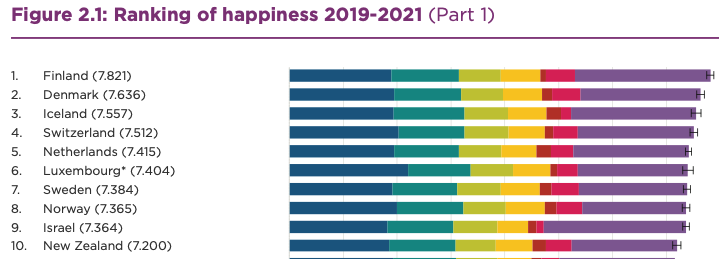Hmmmmmmmmmmmmmmmmmmmmmmmmm
The thing about
H A P P I N E S S
is that it’s not always H A P P Y. . .
World Happiness Report
Reveals More Sadness
and More Kindness During COVID-19
A global survey of subjective well-being looks at how our mental health and behaviors have changed during the pandemic.
When bad things happen—wars, pandemics, shootings—the optimists of the world tend to turn their attention to all the goodness that still exists: the heroic fighters, the frontline workers, the givers and the helpers. But are we just deluding ourselves?
Not if the 2022 World Happiness Report is any indication. Although the pandemic has certainly caused division, there has also been a sizable increase in helping, donating, and volunteering across the globe—so big that the researchers are calling it a “pandemic of benevolence.”
“All must hope that the pandemic of benevolence will live far beyond COVID-19,” write the University of British Columbia’s John F. Helliwell and his coauthors. “If sustainable, this outpouring of kindness provides grounds for hope and optimism in a world needing more of both.”
The World Happiness Report is based on the Gallup World Poll, which surveys around 1,000 people per country in nearly 200 countries every year. The key question, used to create a ranking of the happiest countries in the world, asks people to evaluate their life as a whole on a scale of 0-10, from the worst possible to the best possible. This year, the United States climbed from #19 to #16 in the world, just below Canada and Germany. The top 10 happiest countries were the following:

The Gallup World Poll also asks questions about whether people helped a stranger, donated, or volunteered in the past month. According to the report, the “pandemic of benevolence” began in 2020, with more people helping strangers than in the several years prior. That number continued rising in 2021, alongside more people donating and volunteering, as well. Comparing the several years prior to the pandemic to 2021, the average number of people per country who donated increased from 30% to 37%, while volunteering increased from 19% to 23% and helping strangers increased from 48% to 69%. This trend is even more striking given that, before 2020, charitable donations had been on a long-term decline globally.
The uptick in kind, helpful behavior happened in every region of the world, from North America to Southeast Asia to the Middle East and North Africa. Those increases were particularly high in places that had previously lagged on “prosocial” behavior, like Eastern Europe.
While kindness increased in 2020-2021, people around the globe didn’t actually become less satisfied, according to their evaluations of life as a whole. It’s possible that this global wave of caring may have protected our well-being during the pandemic, the researchers suggest.
“Since this sometimes comes as a surprise, there is a happiness bonus when people get a chance to see the goodness of others in action and to be of service themselves,” the researchers write. Several studies conducted during COVID support this interpretation, finding that giving to others, offering support, and volunteering boosted people’s positive feelings.
Not all of the World Happiness Report’s findings around COVID were so uplifting. For example, we did feel more sadness and many report having fewer and fewer people to count on as the pandemic went on. In line with other research, younger people seemed to have a harder time than their elders, experiencing more negative emotions.
But lately, there have been some signs of recovery. While we (particularly women) became more worried and stressed in 2020, we fared better on both in 2021. And through it all, we still managed to have positive moments—there was no change in the number of people who said they laughed, experienced enjoyment, or did or learned something interesting the previous day.
None of this is meant to minimize the extreme hardships and inequality that people have faced during the pandemic. The researchers acknowledge that the portrait they are painting may be slightly rosier than reality, thanks to the necessity of using more phone surveys, rather than in-person ones. These may not have reached the populations hit hardest by the pandemic: nursing home residents, the homeless, the parents who are too burned out to take a telephone call.
But—as in 2020—the story, at least from these data, is one of resilience. With a little help from each other, perhaps we are stronger and more adaptable than we think.
















 IT’S time to BE
IT’S time to BE




